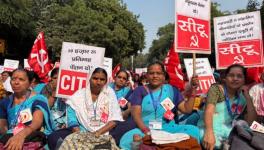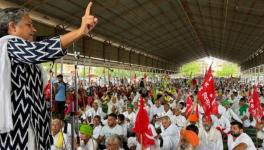COVID-19: Workers Await Salaries While Employers Unsure About Resumption of Operations in Delhi

Image Courtesy: US News & World Report
Subodhan Kumar, a factory worker in Delhi, is getting restless with every passing day. His savings are almost over and he is completely dependent on the ration distributed by Delhi Government through its schools. His vulnerability has escalated further after his employer declined to pay his salary for April owing to complete halt of operations at his steel factory in Bawana Industrial Area in the national capital. The refusal to pay his salary came despite Prime Minister Narendra Modi’s request and directions by Ministry of Home Affairs to not cut salaries during the lockdown, which has been extended thrice so far.
The ministry in its order under Disaster Management Act had said, “All the employers, be it in industry or in the shops and commercial establishments shall make payment of wages of their workers at their work places on due date without any deduction for the period their establishments are under closure in the lockdown.” It added, “It is further directed that in case of any violation of any of the above measures, the respective State/UT government shall take necessary action under the act. The district magistrate/ deputy commissioner and senior superintendent of police/Superintendent of Police/ Deputy Commissioner of Police will be personally liable for the implementation of above directions and lockdown measures.”
Talking to NewsClick, Subodhan said, “I worked as a cutter in the factory. There were 35 workers who made hinges and other accessories at the factory. We worked till March 22 and our employer paid for this period. Later, we were told to leave. The money barely supported my family. I was a permanent worker at the factory. So, I expected that he would pay for April as directed by the government. How will we survive if he does not pay us and lockdown gets extended further? The workers tried to complain to the labour commissioner but he threatened to not hire them if they go ahead with it.”
Meanwhile, Reyaz, who works under a contractor at a cooler factory in the area, expressed his fear about not being paid for their work even during March. He said, “We were working for a contractor who would pay us for the number of units manufactured every month which in turn was supplied to the company. When the initial lockdown was announced in March, our contractor gave us some money for food but is now refusing to pay any money until the work resumes again. We came to earn some money from Malda in West Bengal but are stranded now.”
On being asked about how they are managing ration during the lockdown, Reyaz said, “Wo lal jhande wali party ke log kuchh ration dekar gaye hain (some persons from the party with red flag responded to our distress call and gave us some ration). My parents sent some money through bank but that amount has also exhausted now.” Although separated by state and language, Reyaz and Subodhan interestingly share a common relationship. Both hail from family of landless agricultural workers and their journey to cities fuelled some hope for their families that they would earn some money and send it their families in the villages. The lockdown has extinguished their hopes now. They say that even if they return to their villages, they are less likely to find any work.
Harpal Tyagi, Secretary, North Delhi Local Committee of Centre for Indian Trade Unions, has been helping the stranded workers by distributing ration. He told NewsClick that he is flooded by calls from workers’ complaints about delayed salaries but they have very little options to offer them help. CITU has assisted more than 20,000 distressed workers in different industrial areas in Delhi. Commenting on the complaints, he said, “The Delhi Government has appointed only one commissioner to deal with these complaints. Even if we make a proper complaint against the employer, it is just forwarded to other joint labour commissioners who are not accessible. The anxiety among the workers is such that they have started departing for their native cities.”
Sidheshwar Shukla from CITU, Delhi maintains that the reverse migration is not an economic phenomenon but psychological too. He told NewsClick, “The migration was triggered by the ill-devised policy of government which left workers petrified about their fate. They were not told that the crisis could be mitigated if they took precautionary measures. So, they started believing that if they will die, they want their family members close to their dead bodies. As far as the factory owners are concerned, they are worried that they will not have any working capital once the lockdown is lifted and operations resume. But, can they restrict a right as basic as the salary? No, they cannot. The government has come out with its relaxations. Now, it’s time they do their bit and start paying salaries.”
Also read: Why Home Ministry’s Travel Plan for Migrant Workers Will Cause More Chaos
Get the latest reports & analysis with people's perspective on Protests, movements & deep analytical videos, discussions of the current affairs in your Telegram app. Subscribe to NewsClick's Telegram channel & get Real-Time updates on stories, as they get published on our website.























